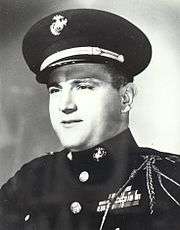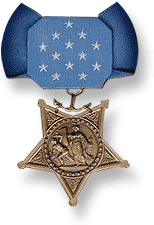Carlton R. Rouh
| Carlton Robert Rouh | |
|---|---|
  Carlton R. Rouh, Medal of Honor recipient | |
| Born |
May 11, 1919 Lindenwold, New Jersey |
| Died |
December 8, 1977 (aged 58) Camden, New Jersey |
| Allegiance | United States of America |
| Service/branch | United States Marine Corps |
| Years of service | 1942 - ? |
| Rank | Captain |
| Unit | 1st Battalion, 5th Marines |
| Battles/wars |
World War II *Battle of Guadalcanal *Battle of Peleliu |
| Awards |
Medal of Honor Silver Star Purple Heart |
Captain Carlton Robert Rouh (May 11, 1919 – December 8, 1977) was a United States Marine who received the Medal of Honor for gallantry in risking his life to save the lives of two fellow Marines on Peleliu Island on September 15, 1944. First Lieutenant Rouh threw his body between his fellow Marines and an exploding grenade. During World War II, 27 Marines similarly used their bodies to cover grenades in order to save the lives of others. Four of these brave Marines survived — including Rouh and fellow Medal of Honor recipients Richard E. Bush, Richard K. Sorenson, and Jacklyn H. Lucas
Rouh had earlier earned a field commission and been awarded the Silver Star medal of gallantry during the Battle of Guadalcanal for action on October 9, 1942.
Medal of Honor action
First Lieutenant Rouh had been moving his mortar platoon near the top of a small coral ridge in preparation for digging in for the night, according to a field dispatch from SSgt James F. Moser, Jr., a Marine Corps Combat Correspondent. 1stLt Rouh decided to inspect an apparently empty Japanese dugout before permitting his men to use it.
A few minutes before, a flame-throwing squad had blasted fire into the position. Near the entrance, two of the enemy lay dead. 1stLt Rouh could hear nothing. He stepped over the pair, and into the dark interior, his carbine ready. Creeping along the wall, he could see stores of supplies. He saw no life.
Suddenly a shot rang out, hitting the lieutenant in the left side. He stumbled back to his men outside. Several Japanese followed, throwing grenades. Fragments filled the air. One grenade landed close to the lieutenant and two of his men. There was no escape, for the Japanese had held it too long to be thrown back.
Despite his weakened condition, 1stLt Rouh shoved his two comrades to the ground to save them from flying fragments. He dropped his carbine and dove for the grenade. He was down on his elbows and one knee when the grenade exploded. His abdomen and chest caught the blast, and he sank to the ground. None of his men were hit.
Still conscious, 1stLt Rouh could half hear and see the rest of the fight. Tommy gun rounds rang out, killing the remaining Japanese survivors. One of his men stood over him. Soon it was all over — and his Marines had their cover for the night.
First Lieutenant Rouh's body was pock-marked by the grenade blast. One steel fragment had passed through his left lung and lodged near his heart. Other fragments sprayed his chest, left side and left arm.
Still under enemy artillery and mortar fire, he was given first aid by a passing doctor, and was carried back to a casualty evacuation point. "That was a miserable trip back," he said. "I thought they would get all the men with me. But somehow we made it."
Marine Corps career
Carlton Rouh enlisted in the United States Marine Corps as a private one month after Pearl Harbor, and fought in three Pacific campaigns. At Guadalcanal, then a private, he earned the Silver Star Medal "for carrying wounded out under fire until wounded himself." Moreover, "for outstanding leadership and initiative in combat", he was given a field commission as a second lieutenant while at a rest camp in Australia. He commanded a machine gun platoon during the New Britain campaign. He had been promoted to the rank of first lieutenant prior to his honored actions on Peleliu.
Following his evacuation from Peleliu, he was hospitalized, and later honorably retired from active duty. He was promoted to captain in the Reserves upon his retirement. He died in December 1977 in Lindenwold, New Jersey.
Medal of Honor citation
The President of the United States takes pride in presenting the MEDAL OF HONOR to
FIRST LIEUTENANT CARLTON R. ROUH
UNITED STATES MARINE CORPS RESERVE
for service as set forth in the following CITATION:
For conspicuous gallantry and intrepidity at the risk of his life above and beyond the call of duty while attached to the First Battalion, Fifth Marines, First Marine Division, during action against enemy Japanese forces on Peleliu Island, Palau Group, 15 September 1944. Before permitting his men to use an enemy dugout as a position for an 81-mm. mortar observation post, First Lieutenant Rouh made a personal reconnaissance of the pillbox and, upon entering, was severely wounded by Japanese rifle fire from within. Emerging from the dugout, he was immediately assisted by two Marines to a less exposed area, but while receiving first aid, was further endangered by an enemy grenade which was thrown into their midst. Quick to act in spite of his weakened condition, he lurched to a crouching position and thrust both men aside, placing his own body between them and the grenade and taking the full blast of the explosion himself. His exceptional spirit of loyalty and self-sacrifice in the face of almost certain death reflects the highest credit upon First Lieutenant Rouh and the United States Naval Service.
See also
References
 This article incorporates public domain material from websites or documents of the United States Marine Corps.
This article incorporates public domain material from websites or documents of the United States Marine Corps.
- "Captain Carlton Robert Rouh, USMCR". Who's Who in Marine Corps History'. History Division, United States Marine Corps. Retrieved May 8, 2009.
- "1stLt Carlton R. Rouh, Medal of Honor, 1944, 1/5/1, Peleliu [Medal of Honor citation]". Marines Awarded the Medal of Honor. History Division, United States Marine Corps. Archived from the original on 2007-02-20.
Further reading
- Gayle, BGen Gordon D., USMC (retired). "Bloody Beaches: The Marines at Peleliu". Marines in World War II Commemorative Series. History and Museum Division, United States Marine Corps. Archived from the original on August 10, 2007. Retrieved October 5, 2010.
External links
- "Carlton R. Rouh". Claim to Fame: Medal of Honor recipients. Find a Grave. Retrieved 2008-01-15.
- Rouh, Carlton Robert "Cobber" at WW2Awards.com